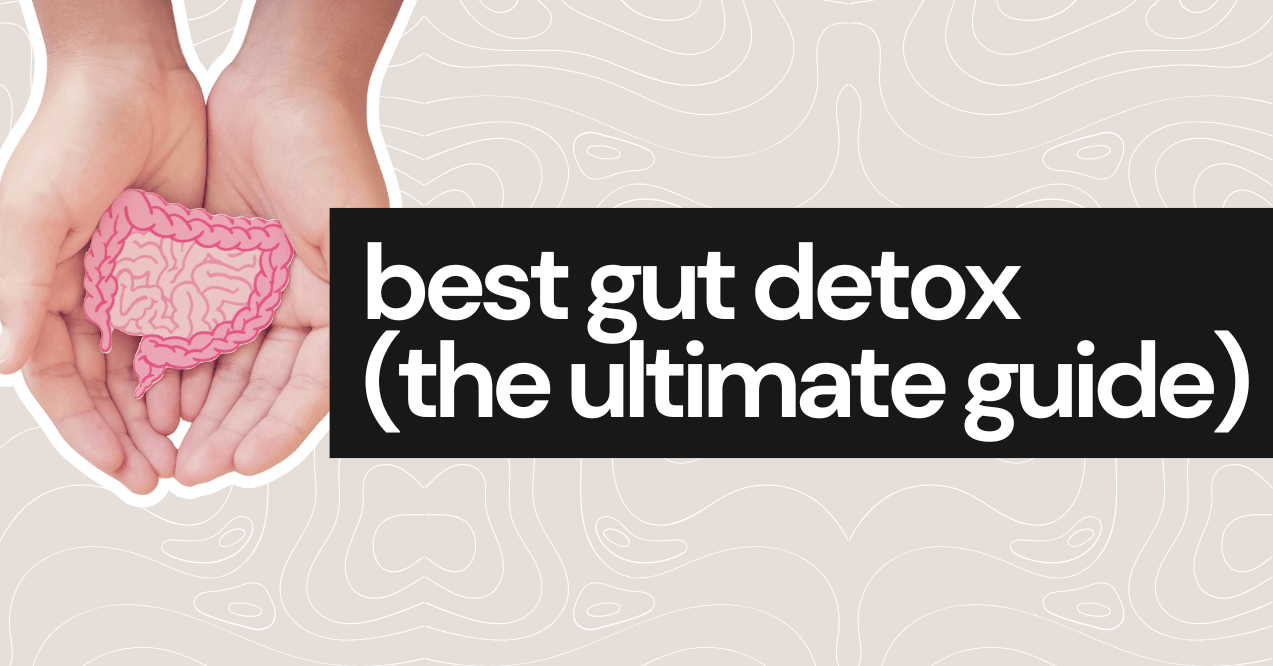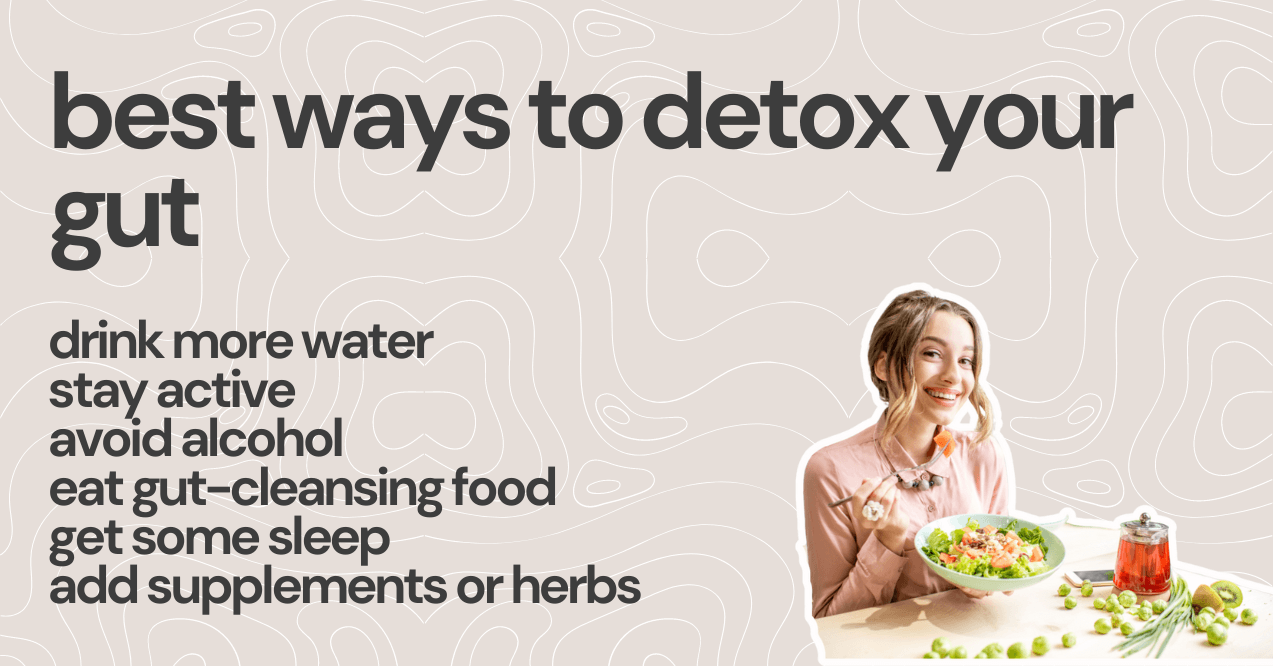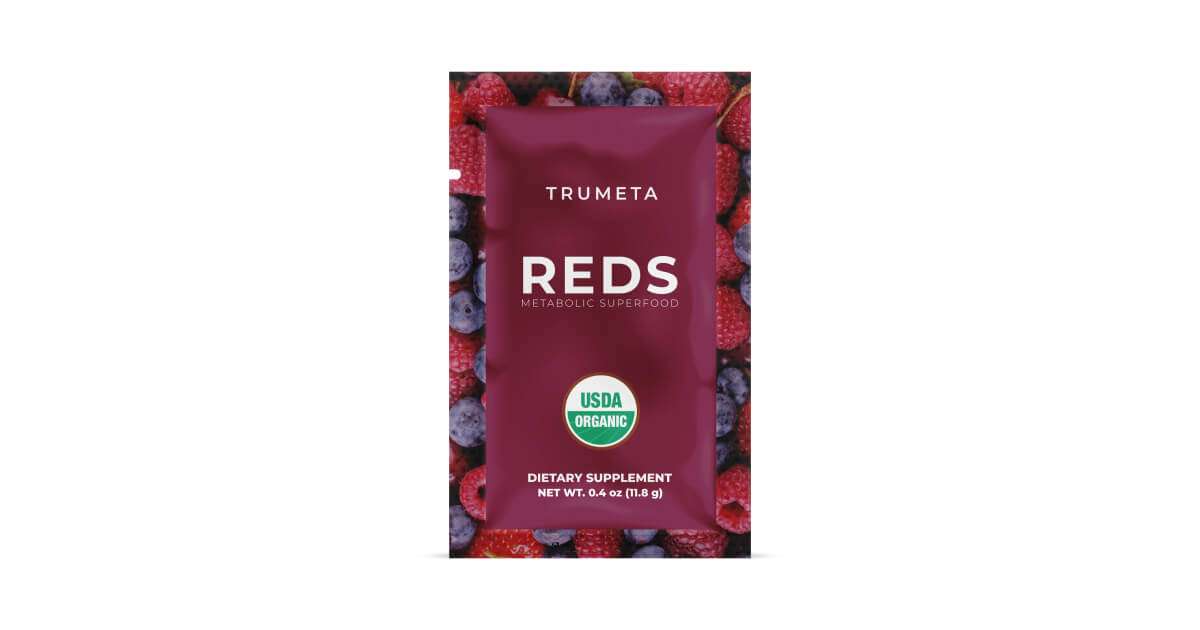health
by trumeta | November 6, 2023
Best Gut Detox (The Ultimate Guide)

Are you embarking on a journey to a healthier you? Understanding the best gut detox methods could be your first, transformative step. Every corner of the internet is brimming with advice that promises a healthier life for you. So it sometimes makes navigating through the labyrinth of wellness advice, dietary plans, and health trends overwhelming.
Yet, amidst this sea of information, the profound influence of gut health often takes a back seat, remaining an unsung hero in the symphony of our overall well-being. We often forget that our gut is more than a digestion powerhouse; it’s an important system that directly impacts our physical and mental health.
The journey isn’t about quick fixes; it’s about sustainable changes that bring along lasting improvements. We understand the uniqueness of each individual, acknowledging that the journey to optimal gut health isn’t a one-size-fits-all. Adding to our toolkit, exploring the best tea for gut health can be a gentle yet effective addition to your regimen as well.
In this comprehensive guide, we unravel the secrets to optimal gut health, showcasing its integral role in supporting immune health and overall productivity. Get ready to revitalize your well-being!
What is Gut Detox?

A gut detox is much like giving your home a thorough spring cleaning. Imagine your body as a beautifully designed structure, with each room representing a different aspect of your health. The gut[1] is akin to the busy, bustling kitchen where the essential task of breaking down, assimilating, and utilizing nutrients takes place. Now, every kitchen needs a thorough clean-up from time to time, and that’s precisely what a gut detox is all about!
The process of gut detox involves a series of steps designed to cleanse the digestive tract, flushing out toxins, and making way for good bacteria to thrive. This practice isn’t just a trend but a holistic approach that may lead to improved digestion and increased energy levels.
In more tangible terms, the best way to detox your gut might include dietary changes where you focus on eating more fiber-rich foods, like fruits and vegetables, and cutting down on processed foods and sugars. Hydration is another crucial aspect – drinking plenty of water aids in flushing toxins out of your system.
When you take steps to detox your gut, the benefits are almost immediate and noticeable. Your digestion improves, which means potentially no more uncomfortable bloating or gas. You might notice that you have more energy throughout the day, and that constant feeling of fatigue may start to fade away. Your skin might become clearer, and even your sleep may improve.
Now, the million-dollar question – how do you embark on the best gut detox journey? It’s not about harsh, restrictive diets or grueling routines. Instead, it’s about nurturing and caring for your gut, feeding it the right nutrients, and adopting lifestyle habits that promote its optimal functioning.
How to Detox Your Gut?
Getting your gut clean and healthy isn’t something that happens quickly; it’s a slow, rewarding process of making choices that are both important and lasting, each one supporting you on your journey to a healthier and happier life.
To detox your gut effectively[2], start by rethinking your diet. Incorporate more natural, unprocessed foods that are rich in fiber, such as fruits, vegetables, and whole grains to aid digestion and eliminate toxins. Cut down on sugary, fatty, and processed foods, which may contribute to toxin build-up.
Don’t forget to stay hydrated by drinking plenty of water daily; it helps flush out toxins and supports overall digestive health. If you ever wonder do probiotics help with bloating? You may try it for yourself. Include probiotics in your diet, either through supplements or foods like yogurt and kefir, to balance your gut bacteria and potentially ease bloating. Exercise regularly to stimulate bowel movements and reduce unwanted pro-inflammatory responses.
Lastly, ensure you’re getting adequate sleep to give your body the rest it needs to repair and regenerate, further supporting the detox process. Each step is simple yet impactful, leading towards a healthier, cleaner gut.
Two Ways of Colon Cleansing
There are two popular methods for cleansing the colon, each offering a distinct approach for gut health support. The first involves the use of natural, dietary measures. This method emphasizes the importance of food and drink intake as vital tools for flushing out toxins from the colon. It often includes a diet rich in high-fiber fruits, vegetables, and whole grains, and the incorporation of gut health supporting fluids, like water and herbal teas, to promote natural bowel movements and toxin elimination.
The second method involves a more clinical approach, utilizing procedures like colon irrigation or colon hydrotherapy. In this process, a professional administers a gentle flush of warm, filtered water into the colon via the rectum. This procedure aims to soften and expel waste material and toxins, providing a thorough cleanse. It’s a direct and immediate cleansing option conducted under the guidance and expertise of a trained professional, ensuring safety and efficiency.
However, studies done in the past suggest that colon cleansing utilizing clinical procedures are potentially risky and do not provide any health benefits[3]. So after all the best way to cleanse your gut just might be the all natural approach.
Best Ways to Detox Your Gut

The journey to a healthier gut is a step-by-step process that begins with making informed and sustainable choices daily. It’s about consistency and making small changes that, over time, lead to potential improvements in gut health and overall well-being.
So, if professional intervention sounds too scary for you and you decided to go for a natural way to detox your gut, we prepared a list of measures that may help you to cleanse out toxins from your body:
1. Drink More Water
Drinking plenty of water helps to keep the digestive system running smoothly, aiding in the breakdown and elimination of waste and toxins from the body. It also keeps the digestive tract lubricated, which makes it easier for waste to pass through and be eliminated from the body. Without enough water[4], digestion may slow down, leading to constipation or uncomfortable digestion.
Additionally, staying hydrated supports healthy digestion and nutrient absorption, contributing to overall gut health. In a gut detox, increasing water intake is a simple yet effective step to enhance the cleansing process, promoting a healthier and more functional digestive system.
2. Stay Active
Regular exercise[5] isn’t just great for building strength and stamina; it’s also a supportive ingredient for maintaining a healthy gut. When you move your body, it stimulates the muscles in your digestive tract, which helps to move food through more efficiently. This means fewer chances for bloating and constipation, making you feel a lot more comfortable.
Exercise also may increase the population of good bacteria in your gut. These beneficial microbes play a role in breaking down food, absorbing nutrients, and even protecting against harmful bacteria. So, when you’re active, you’re indirectly feeding this helpful bacteria, promoting a balanced and healthy gut environment.
Physical activity, whether it’s a brisk walk, a jog, or a dance class, supports your metabolism too. A well-maintained weight is connected to a smoother, more effective digestive process and might help in reducing the risk of various digestive issues. In short, regular exercise is a win for both your overall health and your gut, making it a crucial part of a gut-friendly lifestyle.
3. Avoid Alcohol
Consuming alcohol[6] negatively affects the gut in several ways. It tends to throw off the balance of bacteria, meaning it may reduce the number of good bacteria and allow bad bacteria to thrive. This imbalance may lead to common issues like bloating, gas, and discomfort. Alcohol also may prompt the stomach to produce more acid than usual, which may lead to a burning feeling or stomach pain, and over time, might cause more serious stomach problems.
When you decide to cut back on alcohol or eliminate it altogether, you give your gut a chance to recover. The balance of bacteria may start to return to normal, which helps with digestion and might reduce those uncomfortable symptoms. Without the excess stomach acid caused by alcohol, the risk of stomach pain and other related issues begins to decrease.
Additionally, avoiding alcohol may also have a positive effect on nutrient absorption. A healthier gut is better at soaking up the vitamins and minerals from the food you eat, which supports your overall health.
So, in essence, reducing or skipping alcoholic drinks may be a positive step towards better gut health, leading to improved digestion and overall well-being without complicating your daily routine or diet.
4. Eat Gut-Cleansing Food
When it comes to fostering a healthy gut, certain foods stand out for their beneficial properties. Incorporating a variety of fruits and vegetables, particularly those rich in fiber like apples, bananas, and leafy greens, may aid digestion and promote a balanced gut flora.
Dietary fiber[7] not only helps in regular bowel movements but also supports the growth of beneficial gut bacteria. Probiotic-rich foods are another essential for a happy gut. Best food to cleanse the gut might also include yogurt, kefir, and fermented foods like sauerkraut and kimchi are packed with live, beneficial bacteria. These foods support your gut’s microbial diversity, improving digestion and boosting immune health.
Let’s not forget about the power of tea, a soothing and health-promoting beverage. Peppermint tea[8], in particular, is often hailed as the best tea for gut health. It’s known for its ability to relieve digestive symptoms like bloating and indigestion, thanks to its natural relaxant and anti-inflammatory properties. Including peppermint tea in your diet might offer both comfort and health benefits, making it a popular choice for those looking to enhance their gut health naturally.
Chamomile tea[9], renowned for its calming effects and ability to promote restful sleep, also may have benefits for gut health. Derived from the dried blossoms of the Matricaria plant, a member of the Asteraceae family, chamomile tea has roots in Egypt and is cultivated in various temperate regions globally, including South Africa and India.
One of its key components is apigenin, a potent antioxidant that plays a supportive role in maintaining a healthy gut.
5. Get Some Sleep
Getting enough sleep[10] is closely tied to having a healthy gut. When we get regular, good-quality sleep, it helps our body’s natural rhythms stay balanced, including the processes happening in our gut. This balance is crucial for maintaining the right mix of good bacteria, which aids in proper digestion and keeps our immune system strong. If we’re not sleeping well, it may throw off the balance of bacteria in our gut.
This imbalance might lead to problems like stomach discomfort, indigestion, and even make us more prone to getting sick. Our mood and stress levels may be affected too, as the gut is directly linked to our brain’s health and function.
So, ensuring we’re getting enough rest isn’t just about feeling alert and rested – it’s also a key part of keeping our gut healthy and functioning at its best. It’s as simple as sticking to a regular sleep schedule and making sure we’re getting enough rest each night to support not just our energy levels, but our digestive health as well.
6. Add Supplements or Herbs
Supplements might play a supportive role[11] in gut detox, aiding in the efficient elimination of toxins and supporting overall digestive health. They may provide additional nutrients and support the body’s natural detoxifying processes. For example, fiber supplements may assist in regular bowel movements, supporting the natural elimination of waste and toxins from the body.
Vitamin intake may also play an important role in supporting a healthy gut. Vitamin D may potentially be one of the best vitamins for gut health. It is not only crucial for bone health but also plays a role in maintaining a healthy balance of bacteria in the gut. B-vitamins, particularly B12 and B6, are essential for energy production and may support the health of the gut lining.
Incorporating the right mix of supplements and vitamins, tailored to individual needs, might optimize the gut detox process. It may enhance the body’s natural cleansing mechanisms, support the growth and maintenance of beneficial gut bacteria, and promote overall digestive wellness.
Navigating the world of supplements and herbs for gut health may be empowering when you know where to look. Products like Trumeta Metabolic Greens stand out for their comprehensive blend of nutrients aimed at supporting digestive wellness.

These supplements are rich in a mix of food-sourced vitamins, minerals, and antioxidants that help in flushing out toxins and supporting a balanced gut environment. Additionally, specific herbs have been traditionally hailed for their potential gut-flourishing properties. For instance, ginger is known for its potential to aid in digestion and reduce bloating, while turmeric may have properties that soothe the gut lining. Similar to Trumeta Greens, another supplement mix called Metabolic Reds is excellent for supporting not only gut health but also for improving mental clarity.

Always consider consulting with a healthcare professional to identify the most suitable supplements and vitamins for your specific needs and to ensure a safe and effective gut detox journey.
Conclusion
A healthy gut is the cornerstone of overall well-being, impacting everything from our digestion to mental clarity and immune health. The journey to a revitalized and balanced gut involves thoughtful dietary choices, adequate hydration, regular physical activity, reduced alcohol consumption, and appropriate sleep. Supplements like Trumeta Metabolic Greens may provide an additional support, supplying essential nutrients and compounds that promote the detox process and gut health.
Here is the list of key takeaways for you to remember on your best gut cleanse journey:
- Gut Health Importance: A healthy gut may contribute to overall wellness, including mental clarity and immune function.
- Hydration: Drinking water is essential for flushing out toxins and promoting healthy digestion.
- Physical Activity: Regular exercise supports digestion and promotes a balanced gut environment.
- Alcohol: Reducing or eliminating alcohol helps restore gut bacteria balance and enhances digestive health.
- Gut-Friendly Foods: Incorporate fiber-rich fruits, vegetables, and probiotic-rich foods for a balanced gut.
- Quality Sleep: Adequate rest supports balanced gut bacteria and overall digestive health.
- Professional Consultation: Always seek advice from a healthcare professional before starting any gut detox or supplement regimen to ensure safety and effectiveness.
FAQs
1. What exactly is “Gut Detox,” and why is it important?
A “gut detox” refers to the process of cleansing and rejuvenating the digestive tract to optimize its function and promote overall health. It involves a combination of dietary changes, increased hydration, and lifestyle adjustments aimed at eliminating toxins, and balancing the gut’s bacterial environment. During a gut detox, individuals may focus on consuming nutrient-rich, unprocessed foods, avoiding harmful substances, and incorporating specific supplements or herbs that support digestive health.
By regularly detoxifying the gut, individuals may alleviate digestive issues, supporttheir immunity, and foster a state of overall vitality, laying the foundation for a healthier, more balanced life. Each person’s gut detox journey is tailored to their individual needs, offering a personalized pathway to enhanced wellness.
2. Are there any risks associated with colon cleansing?
Yes, there might be risks associated with colon cleansing that individuals should be aware of.
The process, especially when involving specific procedures like colon irrigation or hydrotherapy, should be approached with caution. Potential risks include dehydration, a shift in the balance of electrolytes in the body, and possible interactions with medications.
There’s also a risk of infection or perforation of the colon if not done properly or safely. It’s essential for anyone considering colon cleansing to consult with a healthcare professional. They can provide personalized advice based on the individual’s health status, ensuring the procedure is safe and appropriate for them, and guide on safer, natural methods of supporting colon health if needed.
3. With so many methods mentioned, which is the most effective way to detox the gut?
Offering a variety of examples is crucial because it acknowledges the diversity in individual health needs, preferences, and body responses. Every person’s body is unique, and a method that works effectively for one person might not yield the same results for another.
By presenting multiple options, readers might explore and consider different approaches to gut detox, allowing them to tailor their strategies based on their specific health status, goals, and lifestyle. It fosters a more personalized and informed approach to health and wellness, enabling individuals to make choices that are aligned with their unique requirements and preferences, leading to more sustainable and effective outcomes.
Sources:
[1] Hornbuckle, W. E. (2008). Gastrointestinal function. In Elsevier eBooks (pp. 413–457). https://doi.org/10.1016/b978-0-12-370491-7.00014-3
[2] Shimizu, M. (2012). Modulation of intestinal functions by dietary substances: An Effective approach to health promotion. Journal of Traditional and Complementary Medicine, 2(2), 81–83. https://doi.org/10.1016/s2225-4110(16)30080-3
[3] Acosta, R. D., & Cash, B. D. (2009). Clinical Effects of Colonic Cleansing for General Health Promotion: A Systematic review. The American Journal of Gastroenterology, 104(11), 2830–2836. https://doi.org/10.1038/ajg.2009.494
[4] Popkin, B. M., D’Anci, K. E., & Rosenberg, I. H. (2010). Water, hydration, and health. Nutrition Reviews, 68(8), 439–458. https://doi.org/10.1111/j.1753-4887.2010.00304.x
[5] Monda, V., Villano, I., Messina, A., Valenzano, A., Esposito, T., Moscatelli, F., Viggiano, A., Cibelli, G., Chieffi, S., & Monda, M. (2017). Exercise Modifies the Gut Microbiota with Positive Health Effects. Oxidative Medicine and Cellular Longevity, 2017, 1–8. https://doi.org/10.1155/2017/3831972
[6] Engen, P. A. (2015). The gastrointestinal microbiome: Alcohol effects on the composition of intestinal microbiota. PubMed Central (PMC). https://www.ncbi.nlm.nih.gov/pmc/articles/PMC4590619/
[7] Fu, J., Zheng, Y., Gao, Y., & Wang, X. (2022). Dietary fiber intake and gut microbiota in human health. Microorganisms, 10(12), 2507. https://doi.org/10.3390/microorganisms10122507
[8] Cash, B. D., Epstein, M., & Shah, S. M. (2015). A novel delivery system of peppermint oil is an effective therapy for irritable bowel syndrome symptoms. Digestive Diseases and Sciences, 61(2), 560–571. https://doi.org/10.1007/s10620-015-3858-7
[9] Gupta, V. (2010). Chamomile: A herbal medicine of the past with a bright future (Review). Molecular Medicine Reports, 3(6). https://doi.org/10.3892/mmr.2010.377
[10] Smith, R. P., Easson, C. G., Lyle, S. M., Kapoor, R., Donnelly, C. P., Davidson, E. J., Parikh, E., Lopez, J. V., & Tartar, J. L. (2019). Gut microbiome diversity is associated with sleep physiology in humans. PLOS ONE, 14(10), e0222394. https://doi.org/10.1371/journal.pone.0222394
[11] Pham, V. T., Dold, S., Rehman, A., Bird, J. K., & Steinert, R. E. (2021). Vitamins, the gut microbiome and gastrointestinal health in humans. Nutrition Research, 95, 35–53. https://doi.org/10.1016/j.nutres.2021.09.001
Popular Posts
Recent Posts
Does Creatine Expire and Lose Its Effectiveness?
July 17, 2024
Should You Take Pre Workout Before Running?
July 11, 2024
What Are the Best Herbs for Muscle Recovery?
June 27, 2024
Can You Drink Protein Shakes Without Working Out?
June 20, 2024


